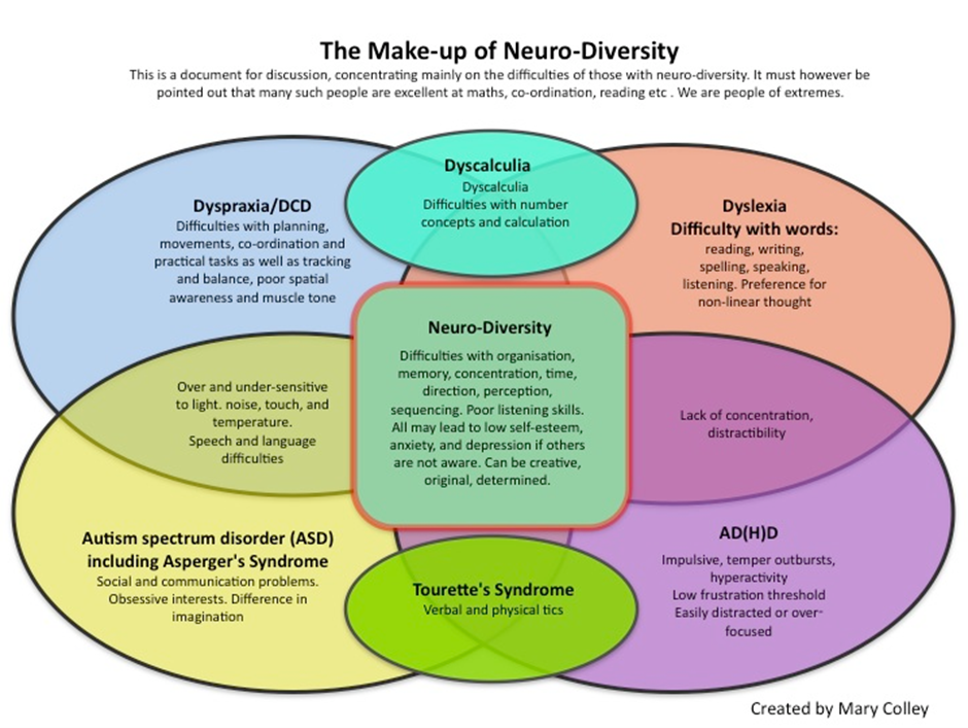Neurodiversity Week 2024 - A Retrospective
Following on from Neurodiversity Week 2024, our team wanted to use the space of our blog to highlight some thoughts and facts on Neurodiversity.
What is Neurodiversity?
When it comes to inclusion, neurodiversity refers to a world where neurological differences are recognised and respected as all other human variations.
How our brains are wired can profoundly change how we: think, move, process information, and communicate in different ways. Neurodiversity is often used as an umbrella term to describe alternative thinking styles such as Dyslexia, DCD (Dyspraxia), Dyscalculia, Autism and ADHD. But regardless of labels, neurodiversity is about considering those who think differently. And no matter whether you are a business, school, university or organisation you can benefit from different thinkers!
‘Approximately 15-20% of population has a neurological difference. Instead of labelling people with deficits or disorders, when we use the term neurodiversity, we take a balanced view of an individual’s unique strengths and challenges. Many ‘challenges’ neurodivergent people face are more to do with the environment and systems they are placed in, often designed by a majority population.’ [1]
Interesting Facts?
· No two people are the same, as a result we all hold different neurological profiles
· Neurodifferences, such as Autism and Dyslexia, are often talked about in isolation but these can occur concurrently in individuals.
· Every individual has a unique pattern of strengths and challenges
· We can find ourselves operating on an approach to diagnosis and labels which can mean that quite often the focus is on the challenges rather than the many strengths and talents of neurodivergent individuals - whereas person-centred approaches should be the priority.
· It is important to harness the strengths and talents of neurodivergent individuals, this helps to build confidence and self-esteem, and ensures individuals are given the opportunity to flourish in their day-to-day [1]
Statistics
~8% of people in the UK are thought to have ADHD.
~10% of people in the UK are thought to have dyslexia.
~8% of people in the UK are thought to have dyspraxia.
~6% of people in the UK are thought to have dyscalculia.
~1% of people in the UK are thought to have an autistic spectrum condition.
~1% of people in the UK are thought to have Tourette's syndrome.
Research has been developing that suggests that certain mental health conditions such as psychopathy, and some personality disorders and schizophrenic conditions will come to be re-interpreted as having been diagnosed both in people who experience symptoms due to poor mental health and people who are experiencing neurodiversity and require different approaches to care.
An additional ~3% of the population are known to have generalised intellectual disability.
Some people believe that being generally intellectually gifted might be a form of neurodiversity, citing rare conditions like savant syndrome and hyperthymesia (highly superior autobiographical memory) as extreme examples of neurodiverse giftedness.
‘Many aspects of society are based on the assumption that there is one form of 'the human mind' and accordingly, many systems (education, employment, health and social services, social relationships) have been built up premised on being neurotypical. Building a society that is accessible for neurodiverse people is not only beneficial for everyone, but fair.’ [2]
In Conclusion
In conclusion, there are some works to be undertaken culturally around the reframing of neurodiversity from historic bias. However, taking time to raise awareness and focus on the topic, in events such as Neurodiversity Week, is key to how we begin to take on new and healthier perspectives on neurodiversity.


